-

新人教版高中英语必修2Unit 4 History and Traditions-Listening&Speaking&Talking教案二
Listening and Speaking introduces the topic of “Take part in a youth project”. The listening text is an interview about "sharing views on historical sites". Through listening to a dialogue between Chinese and foreign students on the way to the Confucius Temple, students can understand their views on the Confucius Temple, Confucius, Confucius' descendants and Confucius' educational thoughts, so as to realize and think about the profound influence of Confucius and his thoughts on Chinese historical tradition. At the same time, the dialogue naturally integrates English idioms and mentions Shakespeare, the British playwright, so as to provide language materials and context for students to understand English idioms and related cultural allusions, as well as to compare Chinese and foreign cultures, which is helpful for students to understand and express the language such as history, tradition, culture and custom significant impact.Text analysis: listening text is a dialogue between a British student and a Chinese student when he goes to the Confucius Temple. When William, a British student, visited the Confucius Temple, he asked Xiao Kong, a Chinese student, for directions. Xiao Kong was just going to the Confucius Temple to meet with the members of the research group, so they went together and exchanged their views on the Confucius Temple, Confucius, Confucius' descendants and Confucius' educational thoughts. From the perspective of foreign tourists, this paper describes their thoughts on Confucius, the great son of Confucius, who had a profound impact on Chinese history and cultural tradition, and his education.Listening and Talking introduces a visit to a historic tourist destination. Tourism is a common way to understand a country's history, culture, and customs and so on. Students listen to the dialogue between Xiao Yan, a youth hostel Usher, and Paul, a backpacker, to learn about Pingyao's famous historical and cultural attractions and Paul's travel experience and experience as a foreign tourist.

新人教版高中英语必修2Unit 5 Music-Reading for Writing教案二
The Internet celebrity Gao Yifeng. Years ago, he owned 5 companies and the staffs over 1,000, but during the economy crisis, he became nothing but debt. He was so worried that his hair became white overnight. There was a time when he wanted to killed himself. But after listening to the song Start Over by Liu Huan, he decided to cheer himself up. He started a steamed bun shop and gradually became a national chain shops. Now he became successful again.Walter Haddon said, “Music is the medicine of a troubled mind.” Music contains such a pleasant and inspiring force. Music gave him courage and bravery. When he listened to the song, it made his spirit fly like a kite in the wind. Music gave him strength and brought him relief. It was the rock I leant on to become strong and to get through those hard times. I hope none of us have to go through the same kind of suffering that he did. At the same time, we all go through various periods when we feel sad or alone. During those times, music can help us in the same way that it helped him. I hope we all will somehow begin to treasure music and make it a part of our life. Thank you for your listening !5.Revise your writing each other.Does he/she explain how music has changed his/her/someone else’s life?Are some of the rhetorical devices included and used properly ?Does he/she talk about how music makes him/her/someone feel?Is the first word in each sentences capitalised?Does he/she use correct punctuation ?

新人教版高中英语必修2Unit 1 Cultural Heritage-Discovering Useful Structure教案二
This theme of the part is “ Describe people or things in greater detail”. Students have learned the grammar(restrictive relative clauses) in Book 1, and further review and consolidate its structure “prep+relative pronouns(which/whom)” and the relative adverbs(when, where and why), besides students should understand its form, meaning and functions. In this section, students should be able to express the grammar correctly in daily communication and in the writing. 1. Review the basic usages of relative pronouns and adverbs of attributive clauses . 2. Learn to use some special cases about restrictive relative clauses.3. Learn to write sentences with restrictive relative clauses flexibly according to the context.1. Review the basic usages of relative pronouns and adverbs of attributive clauses .2. Learn to use some special cases about restrictive relative clauses.3. Learn tow rite sentences with restrictive relative clauses flexibly according to the context.Step 1. Observe the following sentences, and mark the relative pronouns and the adverbs. 1. After listening to the scientists who had studied the problems, and citizens who lived near the dam, the government turned to the United Nations for help.2. Temples and other cultural sites were taken down piece by piece, and then moved and put back together again in a place where they were safe from the water.Step 2 PracticePlease complete these sentences with relative pronouns and relative adverbs and answer the following questions.Questions: 1. What is the head noun ?2. What relative words should be used ?3. What elements do they act in these sentences ?

新人教版高中英语必修2Unit 1 Cultural Heritage-Reading and Thinking教案二
1. This section focuses on "Understanding how a problem was solved”, which is aimed to guide students to analyze and discuss the challenges and problems faced by cultural heritage protection during the construction of Aswan Dam, as well as the solutions. On the basis of understanding, students should pay attention to the key role of international cooperation in solving problems, and attach importance to the balance and coordination between cultural heritage protection and social and economic development. Students are encouraged to face challenges actively, be good at cooperation, and make continuous efforts to find reasonable ways and means to solve problems.2. Enable students to understand the main information and text structure of the reading text;3. Motivate students to use the reading strategy "make a timeline" according to the appropriate text genre;4. Enable students to understand how a problem was solved;5. Enable students to understand the value of protecting cultural heritage by teamwork and global community;1. Guide students to pay attention to reading strategies, such as prediction, self-questioning and scanning.2. Help students sort out the topic language about protecting cultural relics and understand the narrative characteristics of "time-event" in illustrative style3. Lead students to understand the value of protecting cultural heritage by teamwork and global community;

新人教版高中英语必修2Unit 2 Wildlife Protection-Discovering Useful Structure教案二
2.表示现阶段正在进行的被动动作(该动作在说话的瞬间未必正在进行)。Many interesting experiments are being carried out these days.(说话时,并不一定正在进行)3.表示一种经常性的被动行为,常和always,constantly 等表示频度的副词连用,这种用法常常带有赞扬或厌恶的感情色彩。He is always being praised by the leader.4.表示按计划或安排主语将要承受谓语动词所表示的动作(仅限于少数及物动词)。A party is being held tonight.Step 4 Special cases1.像take care of, look after, talk about, think of等动词与介词构成的短语用于现在进行时的被动语态时, 其中的介词不可省略。The ways to stop illegally hunting are being talked about. 2.可与部分情态动词连用,表示对正在发生的事情的推测。She may be being punished by her mother.3.有时可表示按计划或安排将要进行的一个被动动作。A celebration is being held this weekend for his success.4.某些表示“状态、心理活动、存在”等的动词,如have,want,need,love,一般不用现在进行时的被动语态,而常用一般现在时的被动语态。With the population increasing,more land is needed.5.“be+under/in+n.”可表示现在进行时的被动意义。My computer is under repair.=My computer is being repaired.

新人教版高中英语必修2Unit 3 The Internet-Listening &Speaking&Talking教案二
From the pictures in the text and the title--- choose the best app, we can know that this part is about how to save money by using apps.Step 2 While-listening1. Laura and Xiao Bo are talking about apps. Listen to their conversation and find out what apps they want.Xiao Bo is looking for a(n) exercise app to help him get in shape.Laura would like an app for getting rich and another that will make her grades better.2. Listen again. Are the sentences true T or false F?1). Both of Xiao Bo's apps keep track of the steps he takes._____2). Xiao Bo's second app can help him make a fitness plan._____3). Laura needs an app that will help her get discounts.______4). Laura needs an app that will add money to her bank account._______F T F T3. Listen once more and tick the sentence you hear. Underline the words used to express predictions, guesses, and beliefs.Predictions, Guesses, and Beliefs________It might help me walk more.________My guess is that it wouldn't work.________I imagine this app would help me get fit faster________I suppose that would be good.________I guess you could save a little with this app.________I suppose there would be some problems, too.________I believe this app could help me get thinner.

新人教版高中英语必修2Unit 4 History and Traditions-Reading and Thinking教案二
Step 5 While reading---Task 3Read the text again and answer the following questions.Q1: How many countries does the UK consist of ?4 Q2: What are the four countries of the United Kingdom?England, Wales, Scotland and Northern Ireland Q3: Which two were the first to be joined together ?England and WalesQ4: What are the two chief advantages of studying the history of a country ?The first one is to help you understand more about the country and its traditions.The second one is to make visiting it more enjoyable.Q5: What’s the author’s attitude towards studying the history ?Supportive/positiveStep 6 Post reading---Retell the textThe United Kingdom, Great Britain, Britain, England—many people are confused by (1)_____ these different names mean. In the 16th century, the nearby country of Wales (2) __________(join) to the Kingdom of England. In the 19 th century, the Kingdom of Ireland was added to create the United Kingdom of Great Britain and Ireland. Finally, the southern part of Ireland (3) ______ (break) away from the UK, which resulted in the full name we have today. However, most people just use the (4)_________(shorten) name: the UK. The four countries (5)__________ belong to the United Kingdom work together in some areas. There were four sets of invaders and the last group were the Normans. They had castles (6)_________(build) all around England and made changes (7)__________ the legal system. Studying the history of the country will make your visit much more (8)_________(enjoy). The capital city London is (9)___ ancient port city that has a history (10)______(date) back to Roman times. 1. what 2.was joined 3.broke 4.shortened 5.that 6. built 7.to 8.enjoyable 9.an 10.dating Step 6 Homework

新人教版高中英语必修2Unit 5 Music-Discovering Useful Structures教案二
4. When he got absorbed in his world of music, he felt as if he could “see” the beauty of the world around him, like he had in his previous life.P·P as adverbial: _________________________________________________________________.Function: _______________________________________________________________________.Step 5 Solid Complete the passage with the words in brackets in their correct forms.Well known as a successful band, the Impact members show quite a few striking qualities. They never ever give up. When _____________(question) by the media, they are not _____________(discourage) and practise even harder. They are improving themselves by attending several master training class. They are united. _____________(fill with) team spirit, they act as a whole, always aiming for glory. Step 6 Difference and similarity from -ingObserve the following examples.1. He went out, shutting the door behind him.=He went out, ________________________________________________________.2. Not knowing what to do, he went to his parents for help.=__________________________________________, he went to his parents for help.Similarity: _______________________________________________________________________________________________________________________________________________________.Difference : _______________________________________________________________________________________________________________________________________________________.Step Practice1. ________ in a hurry, this article was not so good. 因为写得匆忙, 这篇文章不是很好。2. ________ carefully, he found something he hadn’t known before. 他仔细读书时, 发现了一些从前不知道的东西。3. ________ why he did it, the monitor said it was his duty. 当被问及他为什么要这么做时, 班长说这是他的职责

新人教版高中英语必修2Unit 4 History and Traditions-Discovering Useful Structure教案二
This teaching period mainly deals with grammar: The past participle is used as attributive and objective complement.1. Guide students to review the basic usages of the past participle used as attributive and objective complement.2. Lead students to learn to use some special cases concerning the past participle used as attributive and objective complement flexibly.3. Strengthen students’ great interest in grammar learning.1. Help students to appreciate the function of the past participle used as attributive and objective complement.2. Instruct students to write essays using the past participle used as attributive and objective complement.Step1:温故而知新。Analyze the underlined phrases and then sum up the common usages of the past participles.1.(教材P41)They had castles built(build) all around England, and made changes to the legal system.2.(教材P42)They use the same flag, known(know) as the Union Jack,...3.(教材P42)Judy and I had our car parked(park) in an underground car park near Trafalgar Square, where we could get our car battery charged(charge).Common points: f the past participle used as attributive and objective complement.Step 2:过去分词作定语时的意义1.及物动词的过去分词作定语,在语态上表示被动;在时间上,常表示动作已经发生或完成,有时也不表示时间性。Our teacher watched us doing the experiment and gave us a satisfied smile at last.我们的老师看着我们做实验,最后给了我们一个满意的微笑。The plan put forward at the meeting will be carried out soon.会上提出的计划将很快被执行。2.不及物动词的过去分词作定语,它不表示被动意义,只强调动作完成。Many little kids like gathering fallen leaves in the yard.
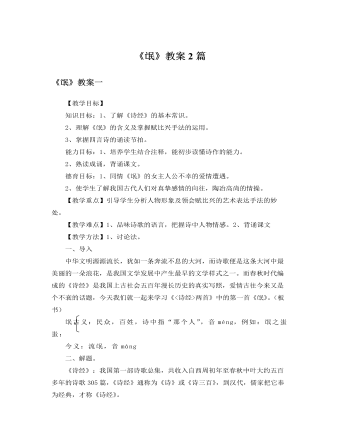
人教版高中语文必修2《氓》教案2篇
从《诗经》的现实主义到屈原的浪漫主义,是中国诗歌发展的一个里程碑。屈原的骚体诗,依诗取兴,引类譬喻,继承发展了《诗经》的比兴传统。《诗经》的比兴较为单纯,而《楚辞》的比兴具有象征的特质,往往成为一个形象的系统。《离骚》中香草美人的比兴就是范例。楚地本是泽乡山国,其间颇有叠波旷宇、崇山秀岭,这些江山的光怪之气足以摇荡心灵、催发丽辞伟句。但骚体诗已冲破《诗经》四言诗的固定格式,句式加长而灵活,篇章放大而严密,诗采绚丽而贴切,是《诗经》之后的一次诗体大解放。有人说,中国历代诗“莫不同祖风骚”,足见其对后代诗歌的影响。先秦时代,《诗经》与《楚辞》双峰并峙,是中国诗史上现实主义与浪漫主义的两座巍然屹立的坐标。
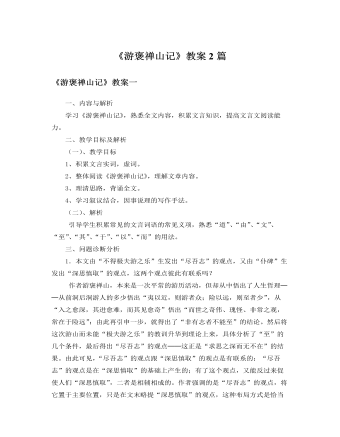
人教版高中语文必修2《游褒禅山记》教案2篇
1.本文由“不得极夫游之乐”生发出“尽吾志”的观点,又由“仆碑”生发出“深思慎取”的观点,这两个观点彼此有联系吗?作者游褒禅山,本来是一次平常的游历活动,但却从中悟出了人生哲理──从前洞后洞游人的多少悟出“夷以近,则游者众;险以远,则至者少”,从“入之愈深,其进愈难,而其见愈奇”悟出“而世之奇伟、瑰怪、非常之观,常在于险远”;由此再引申一步,就得出了“非有志者不能至”的结论。然后将这次游山而未能“极夫游之乐”的教训升华到理论上来,具体分析了“至”的几个条件,最后得出“尽吾志”的观点──这正是“求思之深而无不在”的结果。由此可见,“尽吾志”的观点跟“深思慎取”的观点是有联系的:“尽吾志”的观点是在“深思慎取”的基础上产生的;有了这个观点,又能反过来促使人们“深思慎取”,二者是相辅相成的。

人教版高中语文必修3《过秦论》教案
二、文本解读方法点拨研读课文第三、第四段。要求:师范读,生轻声跟读,然后生齐读。方法:第三段秦统一天下前,应用较强的语势读出,充分渲染塑造一个“威加海内”的帝王形象。统一天下之后,秦王朝至此已达顶峰,这意味着从此转入守势。这段文字义正词严,充分揭露了秦的暴虐无道,故诵读应有“声讨”之势。末句“天下已定”总承以上内容,其后应有较长停顿,然后转入叙秦始皇的心态,用以反衬下文灭亡之速,读时须有嘲讽意,突出“自以为”“万世之业”等词语。第四段起首“始皇既没,余威震于殊俗”两句,暗示民心不服,人人自危,宜用从容、沉着的语调读出。“然陈涉瓮牖绳枢之子……”急转直下,稍作停顿,以下先抑(“陈涉”至“之富”)后扬(“蹑足”至段末)宜读出对比情调。末句叙事结束全篇,要读得沉着、有力。三、信息筛选学生自译课文(一)学生参照文下注释,口译第三、四段,遇有疑难则作好相应标记,为讨论做好准备。
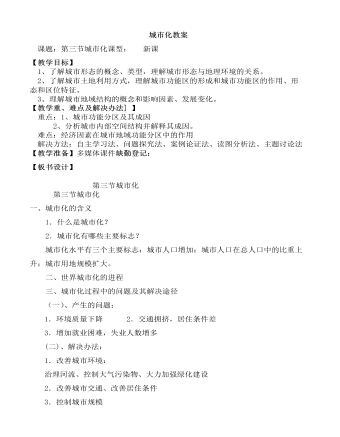
人教版高中地理必修2城市化教案
读《环境污染组图》思考:造成交通拥挤的原因是什么?有什么危害?(原因:汽车的增加、汽车数量与道路状况的比值越来越大造成的。危害:交通阻塞,导致时间和能源的严重浪费,影响城市环境质量。)3.增加就业困难,失业人数增多思考:产生这个问题的原因是什么?(随着城市化发展,城市科学技术提高,机器化大生产使劳动者数量要求降低,城市人口本来就未充分就业,再加上乡村人口大量涌入,导致失业人数增多。)二、解决办法:(以上海市为例,讲解解决的办法。)1.改善城市环境:治理河流、控制大气污染物、大力加强绿化建设为改善城市环境,上海市全面展开对大气、河流、噪声等多方面的治理工作。如苏州河的治理、降低城市污染物浓度、加强绿化建设,截止1990年,市区绿化覆盖率达到20.3%。

人教版高中语文必修1《雨巷》教案
(三)作家介绍,写作背景大家说“雨巷”这首诗写得美不美?(美)刚才我也说了,这首诗是中国朦胧诗的百年经典。那么对于这么出名的诗,有谁能够向我们介绍一下它的作者跟写作背景呢?(明确:戴望舒,原名戴朝实又名戴梦鸥,1905年出生于杭州。1929年4月出版第一本诗集《我底记忆》,他的成名作《雨巷》即收入此集中。1933年8月出版了《望舒草》1948年出版了《灾难岁月》一生留下了诗篇92首。《雨巷》是戴望舒的成名作和前期的代表作,他曾因此而赢得了“雨巷诗人”的雅号。这首诗写于1927年夏天。当时全国处于白色恐怖之汇总,戴望舒因曾参加进步活动而不得不避居于松江的友人家中,在孤寂中咀嚼着大革命失败后的幻灭与痛苦,心汇总充满了迷惘的情绪和朦胧的希望。)(适当板书)
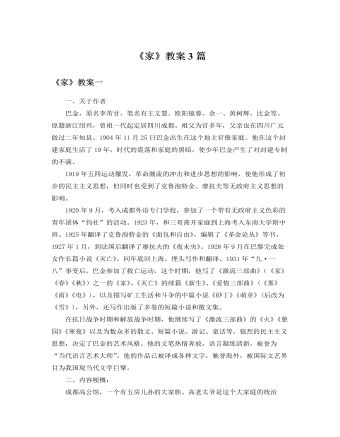
人教版高中语文必修2《家》教案3篇
(幻灯六)巴金作品《家》描写的是“五四”之后,成都地区一个封建大家庭走向崩溃的故事。故事集中在1920年冬到1921年秋的八九个月时间里。成都的一个官僚地主家庭高公馆,一家之主的高老太爷,封建专制,顽固不化。长房长孙觉新,为人厚道,却很软弱,原与梅表姐相爱,后屈从于老太爷之命而与李瑞珏结婚。后来梅和瑞珏双双惨死。觉新的胞弟觉民、觉慧积极参加爱国运动,从而和冯公馆的冯乐山成了死对头。觉民爱上琴,冯乐山却要他娶自己的侄孙女,在觉民觉慧的反抗下,他们终于取得胜利。觉慧爱上聪明伶俐的婢女鸣凤,但冯乐山却指名要娶鸣凤为妾,鸣凤坚决不从,投湖自尽…至此,觉新有所觉醒,而觉慧则毅然脱离家庭,投身革命。(故事主要以高家三兄弟的爱情遭际为线索。)
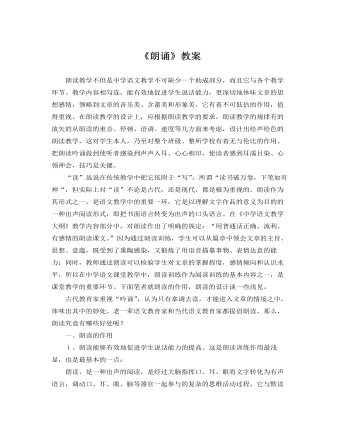
人教版高中语文必修1《朗诵》教案
教师在教学古诗时,只有指导学生反复朗读,才能让学生直接体会到古诗所具有的音乐美,增强学生对古诗的美学感染力,进一步激发学生学习古诗词的热情。除此,在《荷塘月色》、《春》等优美的写景抒情散文中,朱自清运用了不少的叠词,朗读它们,犹如一个个跳动的音符贯穿于文章中,有效地增强了文章的节奏感。通过朗读,学生能够更好地领悟到朱自清散文所具有的音乐美。4、朗读能够增强学生对文章含蓄美和形象美的感染能力:含蓄,是指用少量的、具体的、可感触的艺术形象,来表现丰富的生活内容和思想感情,把诗意藏在富于概括性和内涵丰富的形象中,以瞬间表现永恒,以有限传达无限,以少胜多,给人以推理和想象的广阔大地。“读书百遍,其义自见”,“熟读唐诗三百首,不会作诗也会吟”,“观书须熟读,使其言皆者出于吾云之口;继以精思,使其意皆出于吾之心。”这些话语道出了反复朗读对于理解文章含义所起的重要作用。教师在课堂教学过程中,特别是地教学诗歌时,只有指导学生反复地朗读,才能让学生将文章中隽永的意境,深厚的蕴涵更好地品味出来,从而更好地欣赏到文章的含蓄美。

人教版高中语文必修3《林黛玉进贾府》教案2篇
2、黛玉进入贾府到贾母处,她看到了什么?提示:从荣府西角门进去,走“一射之地”,转至垂花门,过穿堂,绕插屏,再经三间过厅,后面方是贾母居住的正房大院。“正面五间上房,皆雕梁画栋,两边穿山游廊厢房,挂着各色鹦鹉、画眉等鸟雀。”这样穿堂过厅一路行来,仆役、婆子、丫环轮番更换,的确给人以侯门深似海的感觉。然而贾母居处还不是正内室。3、黛玉去拜见二舅舅时又看到什么?提示:往东。“穿过一个东西的穿堂,向南大厅之后,仪门内大院落,上面五间大正房,两边厢房鹿顶耳房钻山,四通八达,轩昂壮丽”。堂屋中迎面“一个赤金九龙青地大匾,匾上写着斗大的三个大字,是‘荣禧堂’,后有一行小字:‘某年月日,书赐荣国公贾源’,又有‘万几宸翰之宝’。”屋内摆设有名贵的家具,珍贵的字画、古玩。“又有一副对联,乃乌木联牌,镶着錾银的字迹,道是:座上珠讥昭日月,堂前黼黻焕烟霞。”由堂屋进入东耳房,这里是起居室,另有一番布置,再到东廊三间小正房王夫人的住室,又别有摆设。
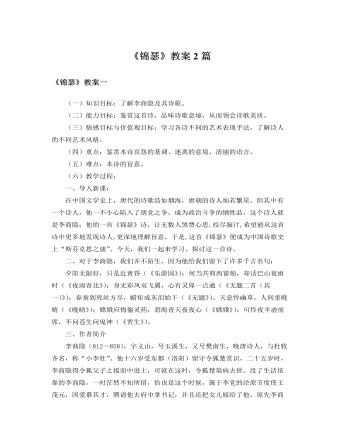
人教版高中语文必修3《锦瑟》教案2篇
【参考】“沧海月明珠有泪,蓝田日暖玉生烟。”沧海中的珍珠只有在明月之夜,才能流下晶莹的泪花;蓝田下的美玉只有在日暖之时,才能升腾飘逸的烟霞。物犹如此,人当如是。“沧海月明”与“蓝田日暖”优美意境的创设,不仅仅是诗人精妙绝伦艺术素养的表现和挥洒,更是诗人回答人生价值的标准和尺度。诗人以物推人,拓展深化了诗作的主题,整篇的闪光点在此,魂亦在此。【参考】“此情可待成追忆,只是当时已惘然。”追忆过去,尽管自己以一颗浸满血泪的真诚之心,付出巨大的努力,去追求美好的人生理想,可“五十弦”如玉的岁月、如珠的年华,值得珍惜之时却等闲而过;面对现实:恋人生离、爱妻死别、盛年已逝、抱负难展、功业未建……,幡醒悟之日已风光不再。如泣如诉的悲剧式结问,又让诗人重新回到对“人生价值到底是什么?到底该怎样实现?”深深的思考和迷惑之中,大大增强了诗作的震撼力。

人教版高中语文必修4《窦娥冤》教案
窦娥的三桩誓愿明明是幻想,却偏偏写成现实,明明是不合理的偏偏写成合理的,这说明了什么?明确:这说明在当时的历史条件下,除了乞求天地鬼神申诉冤屈以外,没有别的办法,作者采用这种浪漫主义的表现手法,一是表明社会的腐败黑暗,二是刻画窦娥强烈的反抗精神,三是表达人民要惩治邪恶的愿望。“煞”就是结尾的曲牌,为什么关汉卿要把“煞”分成[二煞][一煞][煞尾]三个曲牌呢?明确:说明蓄积在窦娥胸中的怒火再也无法控制,犹如地下岩浆,冲向决口。也说明剧作家意犹未尽,他要把窦娥的无辜受害,要把人们对窦娥的同情,要把人们对统治者的愤恨表现得痛痛快快,淋漓尽致。于是在结尾处一波三折,把高潮推向顶峰。《窦娥冤》中有两句唱词,两个牌文本不同,试分析其优劣。《古名家杂剧》本:地也,你不分好歹难为地;天也,我今日负屈衔冤哀告天。

人教版高中语文必修5《边城》教案
【教学过程】一、介绍作者沈从文先生(1902~1988),现代作家、历史文物研究学者。原名沈岳焕,笔名小兵、懋琳、休芸芸等。湖南凤凰(今属湘西土家族苗族自治州)人。1926年出版第一本创作集《鸭子》,有7O余种作品集,被人称为多产作家。主要代表作有:短篇小说《丈夫》、《贵生》、《三三》,长篇小说《边城》、《长河》,以反映湘西下层人民生活的作品最具特色。他的创作表现手法不拘一格,文体不拘常例,故事不拘常格,尝试各种体式和结构进行创作,成为现代文学史上不可多得的“文体作家”。在文学态度上,沈从文先生一直坚持自由主义立场,坚持文学要超越政治和商业的影响。1948年沈从文先生受到了左翼文化界猛烈批判,郭沫若斥责沈从文先生:“一直是有意识的作为反动派而活动着”。下半生从事文物、工艺美术图案及物质文化史的研究工作。1978年调中国社会科学院历史研究所任研究员,致力于中国古代服饰及其他史学领域的研究。于1980年应邀赴美国讲学,并进入诺贝尔文学奖的终审名单。